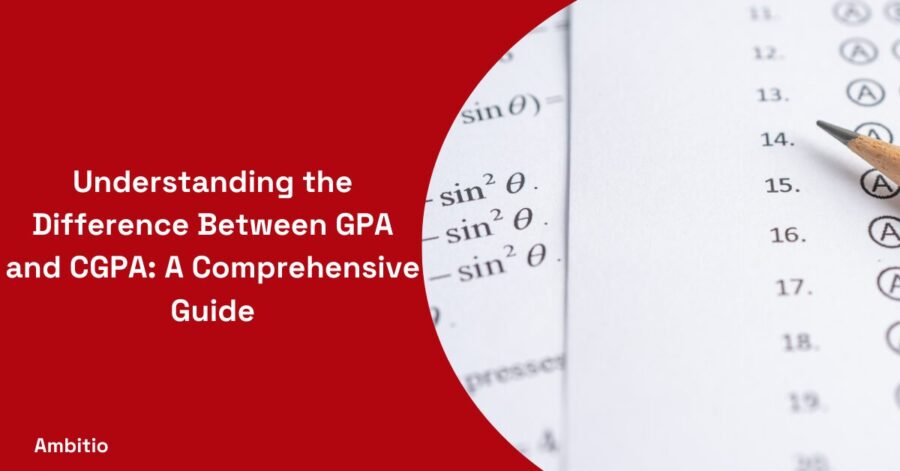13 December 2024
6 minutes read
Understanding the Difference Between GPA and CGPA: A Comprehensive Guide

In the realm of academic performance assessment, GPA (Grade Point Average) and CGPA (Cumulative Grade Point Average) are often used interchangeably, yet they have distinct meanings and implications.
This comprehensive guide aims to demystify these terms, providing clarity on their differences, importance, and the ways in which they influence a student’s academic and professional prospects.
Understanding the Basics: GPA and CGPA Defined
What is GPA?
GPA, or Grade Point Average, is a numerical assessment of a student’s academic performance over a specific period, usually a semester or term. It is calculated by taking the average of the grade points earned in each course, weighted by the credit hours of those courses.
The grading scale can vary, but in many institutions, it is based on a 4-point or 10-point system, where each letter grade (A, B, C, D, F) corresponds to a numerical value.
The Concept of CGPA
CGPA stands for Cumulative Grade Point Average. Unlike GPA, which is confined to a single semester or term, CGPA is an overarching measure that represents the average of all semester GPAs during a student’s entire academic tenure.
It provides a comprehensive overview of a student’s overall academic performance. This cumulative approach is pivotal for reflecting consistency and long-term academic commitment.
Delving Deeper: How GPA and CGPA are Calculated
The Calculation Process of GPA
Calculating a Grade Point Average (GPA) involves a specific set of steps, each crucial for accurately assessing a student’s academic performance over a semester. Here’s a detailed breakdown of this process:
- Assigning Numerical Values to Grades:
- Each letter grade received in a course (A, B, C, etc.) is assigned a numerical value, often on a 4.0 scale. For example, an ‘A’ might be 4.0, a ‘B’ could be 3.0, and so forth.
- The scale may vary depending on the institution’s grading policy.
- Determining Course Credit Hours:
- Each course is assigned a certain number of credit hours, usually reflecting the course’s weight and the time spent in class. For example, a course that meets for three hours a week might be worth 3 credits.
- Each course is assigned a certain number of credit hours, usually reflecting the course’s weight and the time spent in class. For example, a course that meets for three hours a week might be worth 3 credits.
- Calculating Grade Points for Each Course:
- Multiply the numerical value of the grade by the number of credit hours for each course.
- For example, an ‘A’ (4.0) in a 3-credit course yields 12 grade points (4.0 × 3).
- Totaling Grade Points for All Courses:
- Add up the grade points from all courses taken in a semester.
- Add up the grade points from all courses taken in a semester.
- Summing Total Credit Hours:
- Add up the total number of credit hours for which the student was enrolled during the semester.
- Add up the total number of credit hours for which the student was enrolled during the semester.
- Dividing to Find the Average:
- Divide the total grade points by the total number of credit hours.
- This gives the average performance across all courses, weighted by course credit hours.
- Adjusting for Institutional Policies:
- Some institutions may use variations in the grading scale, like pluses and minuses (e.g., A-, B+), each with a distinct numerical value.
- Institutions may also have policies on how to handle failed courses, withdrawals, or incompletes.
- Rounding the Final GPA:
- The final GPA is often rounded to a certain decimal place, per the institution’s standards.
- The final GPA is often rounded to a certain decimal place, per the institution’s standards.
- Repeating for Each Semester:
- This process is carried out for each semester individually.
- Semester GPAs can be monitored for academic progression and advising purposes.
- Understanding the Impact:
- Knowing how the GPA is calculated helps students in setting realistic academic goals and identifying strategies for improvement.
- It is also beneficial for understanding how specific courses or grades can impact overall academic standing.
By following these steps, a GPA is calculated to reflect a student’s academic performance in a specific time frame. This systematic approach ensures fairness and accuracy in academic assessment, crucial for both students and educators in the evaluation and planning of educational trajectories.
Understanding CGPA Calculation
CGPA calculation, on the other hand, requires accumulating all the grade points a student has earned over their entire academic career and dividing this total by the sum of the credit hours across all semesters. This average gives a holistic view of a student’s academic journey, smoothing out the variations that might occur in individual semester performances.
The Comparative Perspective: GPA vs CGPA in Academic and Career Contexts
Academic Implications of GPA and CGPA
GPA (Grade Point Average) and CGPA (Cumulative Grade Point Average) are pivotal in academic evaluation, but they serve different purposes and have distinct implications in various academic contexts:
- Semester Performance vs. Overall Consistency:
- GPA reflects a student’s academic performance in a specific semester, making it a timely measure of recent academic success or struggles.
- CGPA provides a cumulative overview of a student’s performance over the course of their study. It’s more representative of overall academic consistency and endurance.
- Course and Major Selection:
- High GPAs in certain courses or semesters can influence a student’s decision to pursue specific majors or specializations.
- A strong CGPA is often a prerequisite for certain competitive majors or honors programs, as it indicates sustained academic excellence.
- Scholarship and Financial Aid Opportunities:
- Many scholarship programs assess a student’s GPA for eligibility, especially when considering performance in particular subject areas or semesters.
- CGPA is frequently used as a criterion for renewing scholarships or for cumulative performance-based financial aid.
- Graduate School Admissions:
- Graduate programs may look at semester GPAs to assess expertise in relevant subject areas.
- CGPA is crucial for overall graduate school admissions, as it reflects a student’s long-term academic capabilities and work ethic.
Professional Relevance of GPA and CGPA
In the professional world, GPA and CGPA also play significant, albeit different, roles:
- Internship and Entry-Level Job Opportunities:
- Employers might scrutinize semester GPAs to evaluate recent academic performance, particularly for internships or entry-level positions.
- Some industries or roles that require specific skill sets or knowledge areas may prioritize semester GPA over CGPA.
- Long-Term Career Prospects and Advancements:
- A high CGPA can be indicative of a candidate’s overall aptitude and consistency, qualities valued in many professional settings.
- Certain competitive fields or advanced positions may require a comprehensive review of a candidate’s academic history, where CGPA becomes a critical factor.
- Job Application and Career Development:
- While some employers emphasize GPA for recent graduates, many shift focus to practical skills and experience as a career progresses.
- CGPA can be a factor in career advancement, especially in fields that highly value academic credentials and continuous learning.
- Networking and Professional Reputation:
- GPA and CGPA can be talking points in networking scenarios, especially in academic or highly specialized professional circles.
- A strong academic record, reflected in GPA and CGPA, can enhance a professional’s credibility and reputation in their field.
Translating the Numbers: Converting Between GPA and CGPA
The Need for Conversion
Understanding how to convert between GPA and CGPA is essential for students, especially those transitioning between educational systems or applying to international universities. The conversion process allows students to align their academic records with the grading standards of the institution or country they are applying to.
Conversion Methodology
The conversion from GPA to CGPA (or vice versa) involves a standardized calculation that considers the total number of credits and the grade points earned in each course.
This method requires a thorough understanding of the specific grading system and conversion formulas used by the educational institution or the desired university.
Beyond the Numbers: The Broader Impact of GPA and CGPA
Influencing Academic Choices and Opportunities
GPA and CGPA are not merely numerical values; they have a significant impact on various aspects of a student’s academic journey and opportunities. Here’s how:
- Determining Academic Trajectory:
- High GPAs can open doors to more challenging and prestigious courses, encouraging students to explore and excel in their areas of interest.
- A robust CGPA is often a key criterion for enrolling in advanced studies or specialized programs, influencing the direction of a student’s academic career.
- Influencing Study Abroad Opportunities:
- Many international programs and universities place a high emphasis on GPA for semester-specific achievements and CGPA for overall academic performance.
- Students with strong GPAs and CGPAs have better chances of getting accepted into competitive study abroad programs.
- Impacting Scholarship Awards and Financial Support:
- Scholarships and grants often require maintaining a certain GPA or CGPA, making these metrics crucial for financial planning.
- Academic scholarships and fellowships, especially for postgraduate studies, typically look at CGPA as a measure of sustained academic excellence.
- Shaping Student Confidence and Motivation:
- A strong GPA can boost a student’s confidence and motivation, encouraging them to set and achieve higher academic goals.
- Consistently maintaining a good CGPA can reinforce a student’s self-perception as a successful and capable learner.
Setting the Stage for Future Success
The impact of GPA and CGPA extends beyond academia, playing a pivotal role in shaping a student’s career and future.
- Influencing Job Market Entry:
- A high GPA, especially in major-related courses, can make a significant difference when applying for internships and entry-level jobs.
- CGPA is often considered by employers as an indicator of a candidate’s overall competence and diligence.
- Building a Professional Persona:
- Academic achievements, as reflected in GPA and CGPA, contribute to building a professional persona, showcasing commitment and intelligence.
- In some professional circles, especially academia or research, a high CGPA is a testament to a person’s intellectual capabilities and work ethic.
- Facilitating Networking and Mentorship Opportunities:
- Academic success can lead to networking opportunities with professors, alumni, and industry professionals, opening doors to mentorship and career advice.
- A strong academic record can be a conversation starter and credibility builder in professional networks and industry events.
- Foundation for Lifelong Learning:
- The discipline and habits developed to achieve a good GPA or CGPA often set the foundation for lifelong learning and continuous personal development.
- These metrics can reflect a person’s ability to handle challenges and adapt to new learning environments, skills valuable in any career.
Conclusion: Embracing the Full Spectrum of GPA and CGPA
GPA and CGPA are more than just academic metrics; they are reflections of a student’s journey, efforts, and achievements. Understanding their nuances, implications, and the ways in which they can be leveraged for future success is crucial for students and educators alike.
In the end, while GPA and CGPA are key indicators of academic performance, they should be viewed as part of a broader portfolio that includes skills, experiences, and personal growth.
FAQs: Addressing Common Queries About GPA and CGPA
Q1: How can I improve my GPA or CGPA?
Improvement strategies include focusing on time management, seeking academic assistance, prioritizing high-credit courses, and maintaining a consistent study schedule.
Q2: Do extracurricular activities affect my GPA or CGPA?
Directly, they do not. However, a well-rounded profile with extracurriculars can complement a strong GPA/CGPA, especially in holistic admissions processes.
Q3: Is a perfect GPA or CGPA necessary for success?
While important, they are not the sole determinants of success. Skills, experiences, and personal attributes also play crucial roles.

You can study at top universities worldwide!
Get expert tips and tricks to get into top universities with a free expert session.
Book Your Free 30-Minute Session Now! Book a call now




























